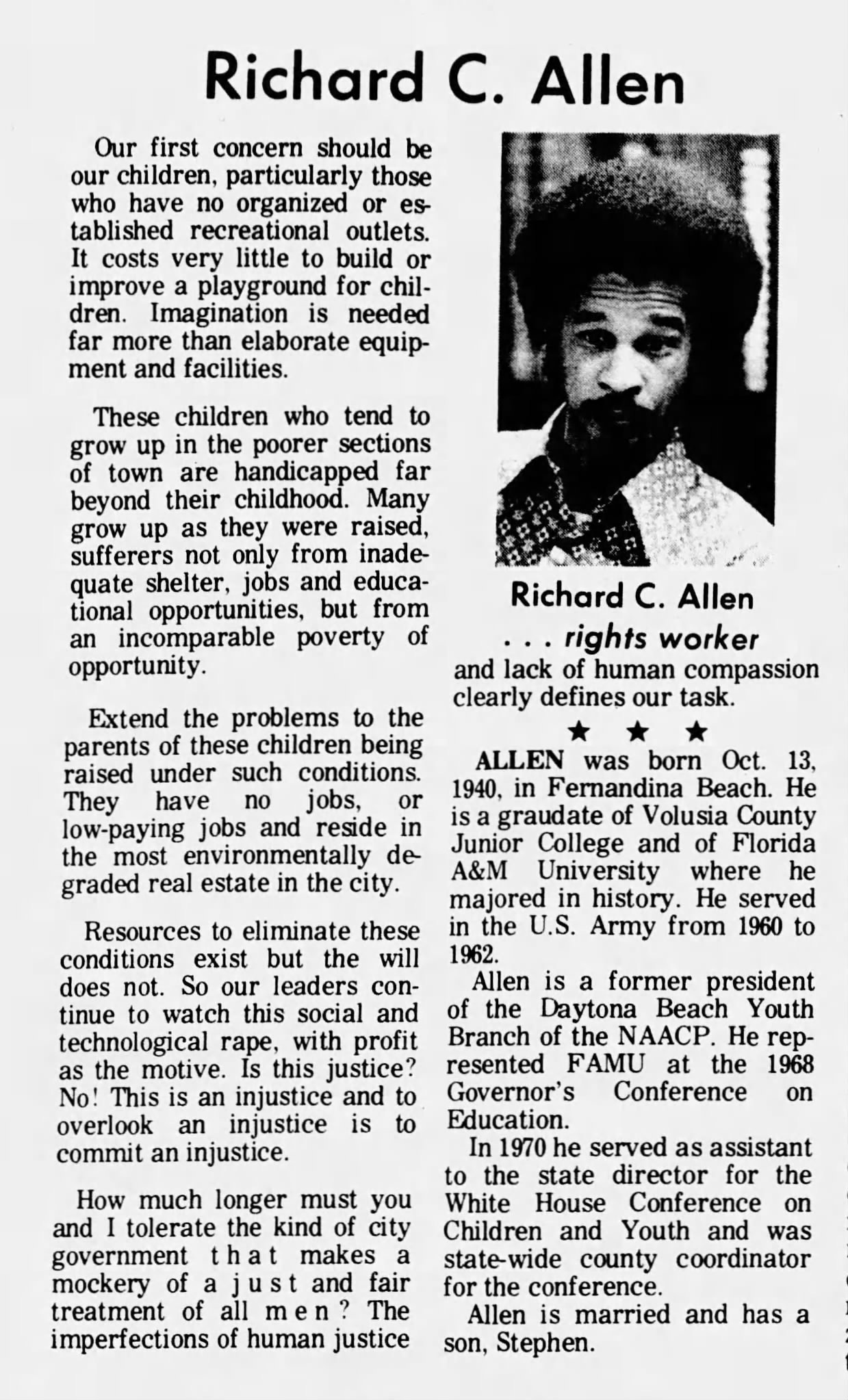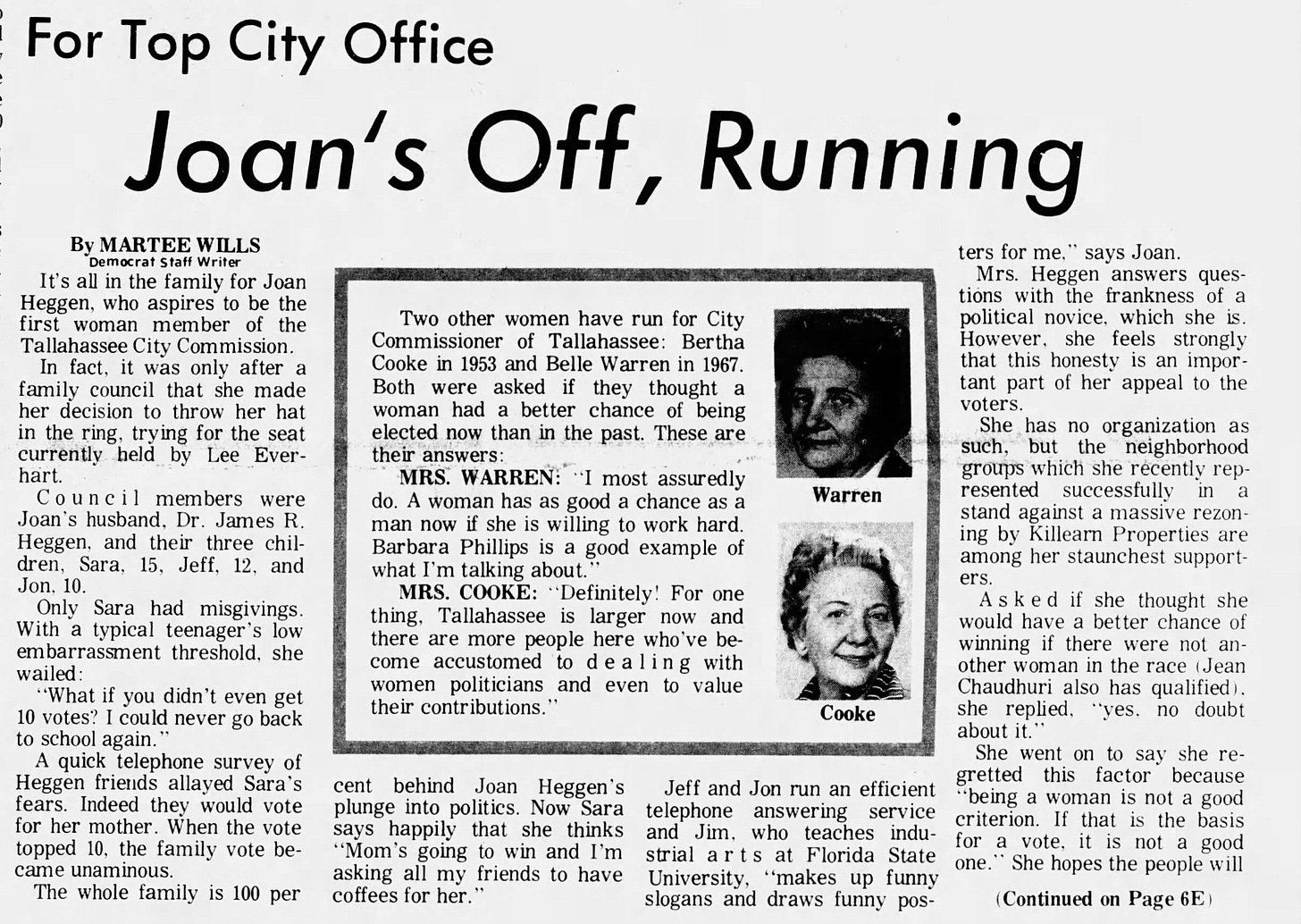Issue #162: Black Representation in Tallahassee Part 4: The Activism of Jean Chaudhuri
Today is Part 4 of my series on racial representation in Tallahassee. This is a series I am doing covering the efforts of black leaders to win elected office in Florida’s capital city. I ended part 3 looking at the election of the city’s first black commissioner since reconstruction, James Ford.
Issue #159: Black Representation in Tallahassee Part 3: The Election of James Ford
Today I have Part 3 of my series on racial representation in Tallahassee. This is a series I am doing covering the efforts of black leaders to win elected office in Florida’s capital city. My last two articles have covered the following….. Part 1:
Ford’s win marked a major milestone in the city. Since 1957, black candidates had run and lost bids for city commission in a town still heavily white. Ford won not only by doing strong in the west side of the city, which was more racially diverse and had a large student presence, but by getting decent margins in the near-universally white east end; which was made up of many old families that dominated city politics.
However, Ford’s election was only the first step in a long path to more equitable representation in the city, as well as the area’s march from an old southern town to a growing urban and liberal center. Ford would serve on the commission through the 1970s, but there would be tension between him and many black residents due to his moderation. Ford came from the heavily white suburbs and was very much a black commissioners white residents could get along with. He had a tough needle to thread.
As the 1970s progressed, more candidates would run aiming to elevate issues in the black community. Today’s article will focus on just one race, the 1972 contest. This race is unique for the coalition that built around one candidate.
The 1972 Commission Race
The 1972 elections provide a good look at the state of play for politics within the County and City. County voters would go to the polls in March for the Presidential Primaries, but first they would spend February on a city commission contest. That election marked some major firsts for the city.
Incumbent Lee Everhart, a developer elected in 1969 over black candidate Edwin Norwood, was running again. I covered that in Part 2 of my series. The race quickly became crowded with several names. He was a prominent developer when elected and became one of the faces for the city’s expansion; for good or ill. His re-election came as city voters grew warry of uncontrolled development.
Joan Heggen, a former state employee from Wisconsin married to an FSU professor, filed to run against Everhart after being the leader of efforts to halt rezoning areas that, if passed, would have sped up development. Heggen highlighted major issues city residents felt when it came to run-away development, pushed by construction firms, with little environmental regard. This sentiment aided conservationist Loring Lovell in his win in 1971 along with James Ford.
Richard Allen, a young black candidate who graduated from FAMU, made his second play for the commission. If you go back to my James Ford article, you will see Allen was one of two black candidates to file for the other commission seat that was eventually taken by Lovell. However, Allen, young and outspoken on issues around black parts of the city, namely their lack of investment, scared off white voters and the newspapers. In 1971, Allen and his fellow black opponent Raleigh Juggar, would not see their combined vote get to the level Ford did in the other contest.
This highlights that Ford’s win was aided by support from whites, who, if you read Part 3, saw Ford as more “respectable” - as paternalistic and racist as that sounds (it was). Many white residents did not like black candidates being so loud on black-specific issues. This dynamic would not change this year, with Allen not shying away from discussing issues like the lack of paved roads in parts of heavily-black communities, lack of parks, and house quality concerns. This would again scare white voters.
While Allen was the only black candidate in the race, he was not the only non-white candidate. Jean Chaudhuri, a Seminole and Creek Native American, filed for the seat as well. She met her husband in college in Oklahoma and re-located to Tallahassee when her husband took a job with FSU. Chaudhuri would hit on many of the same issues around the city being in the hand of developers, the lack of outside voices, and disproportionate use of resources away from black areas and toward the growing white suburbs.
Chaudhuri’s campaign would get a good deal of coverage. Her activism in Native American culture and rights were blossoming by this point, with her directly discussing the Native ties to Tallahassee before it became the state capital.
Chaudhuri generated far more support within the more diverse and liberal west than Allen was able to. A political organization, All Citizens Together (ACT), formed and was made up of students, faculty, & black activists. ACT announced that it was backing Chaudhuri for the commission seat and planned to campaign for her.
Also running was Ben Thompson, a young attorney who had access to a decent war chest from fellow attorneys. However, in a big race of personalities, Thompson would be overlooked. Meanwhile, Heggen’s campaign also generated tremendous attention because between her or Chaudhuri (though I believe the paper was thinking much more about Heggen) there was a chance for a female commissioner to finally be elected. Only a few women had run in the past two decades, with none winning. Heggen did not shy from women’s issues, expressing support for the feminist movement and highlighted the issues women faced trying to enter the workforce. She did, however, make a point to say she wasn’t on board with all aspects of the “women’s liberation movement” (what that means or if it was just a throw out line to appease men, I don’t know).
Heggen herself believed the mood was actually set for a woman to win with voters feeling the time was past due. She told the Tallahassee Democrat….
“These people say ‘now we have an ecologist (Lovell) and a black (Ford) on the commission. Next we must get a woman.’”
In my last article, I discussed the importance of local coverage for candidates. These were low-money races over a short time in a town of about 80,000 but with maybe 15,000 votes for city races. The Tallahassee Democrat continued to offer up paternalistic coverage of non-white candidates. Chaudhuri got better treatment, with her being applauded for her convictions but also dismissed as too naïve. Allen, meanwhile, got the hostile treatment he got in 1971, being treated as if he only cared about black issues. Indeed Allen largely focused on issues for black community - because those communities were still straggling behind in development.
The paper made it clear that it felt Heggen was the best choice, with Everhart seriously seeming to be at risk of losing his seat. Everhart did benefit from raising the most cash. I actually found some fundraising reports, so here is the totals through the primary.
Lee Everhart - $3,185 ($25,000 today)
Ben Thompson - $2,463 ($19,000 today)
Joan Heggens - $1,228.00 ($9,500 today)
Jean Chaudhuri - $842 ($6,500 today)
Richard Allen - $0 reported
On February 15th, the primary was held. Joan Heggen secured 1st place with 32% of the vote, with Everhart back at 30%. Heggen won 3 of the precincts, taking the whiter neighborhoods in the west but also taking the student and diverse Precinct A. Jean Chaudhuri, despite coming in 3rd with 20%, won Precinct D, which was just under 40% black and home to FSU and FAMU.
The results here, and I included Allen’s share on the right side of the map, highlight how much Jean consolidated non-white support in her bid. She was the candidate of students and black voters, but unfortunately it was not enough to advance.
Even still. I made this custom map because I like it. This also shows the college sites as well as race registration data from the year before (don’t get me started on data availability issues here).
The runoff would be just one week later and Everhart was clearly in trouble. Taking 30% as an incumbent and facing another white candidate was the worst it could be for Everhart. The sad truth for the time is its hard to see Chaudhuri winning a runoff at this time. However, Heggen and Chaudhuri combined to over 50% for women candidates and most of Everhart’s opposition were all singing similar tunes on development issues. One week later, Heggen would easily win the runoff by 18 points.
Heggen won every precinct in the city, becoming the first female commissioner in city history. She would consolidate support from the diverse west end, leaving Everhart to keep the east precincts close.
Chaudhuri would end up leaving Tallahassee later that year, as her husband took a new job at the University of Arizona in Phoenix. Jean, who’d remained active in Native American politics in the months after the race, said she felt bittersweet about leaving the city, but was excited to get involved in activism out in the west. This would quickly come to pass, as Chaudhuri was getting coverage in the Tucson Daily Sun later that same year.
Jean Chaudhuri would go on to have a decades-long career in activism for Native Americans. A full breakdown of her work can be viewed here and here. She left a mark on Native American activism. Sadly she would pass away in 1997 at the age of 59. Her city commission run in Tallahassee is an early footnote in her biography, but her bid for council left a mark with the coalition it formed. Unfortunately for Chaudhuri, her coalition wasn’t enough in 1972. Today, however, would be a different story.
Looking Ahead
My next installment in this series will move through the 1970s and city council bids from black candidates like Rosa Houston and Harold Knowles. I also will start Part 5 with a look at county/city politics in relation to national and state events, as this would effect the ability of candidates representing the interest of the black community to win. The 1970s would be a series of painful losses and close calls for black candidates/voters. Its not the progressive decade many would have hoped for. However, it would lead into a major breakthrough in the 1980s. My goal right now is to get through the 1990 contest for the end of this series. I cannot say how many more issues it will take. Some races will be breezed through while others, like this one, will get more details, as it sets up context for down the line.
Hope you have enjoyed this history trip so far. Also, if you think this is ALOT of info for a North Florida city, just wait until the Ukraine History series starts cranking out later this year.
That’s all for now.
PS…… go watch Killers of the Flower Moon.














